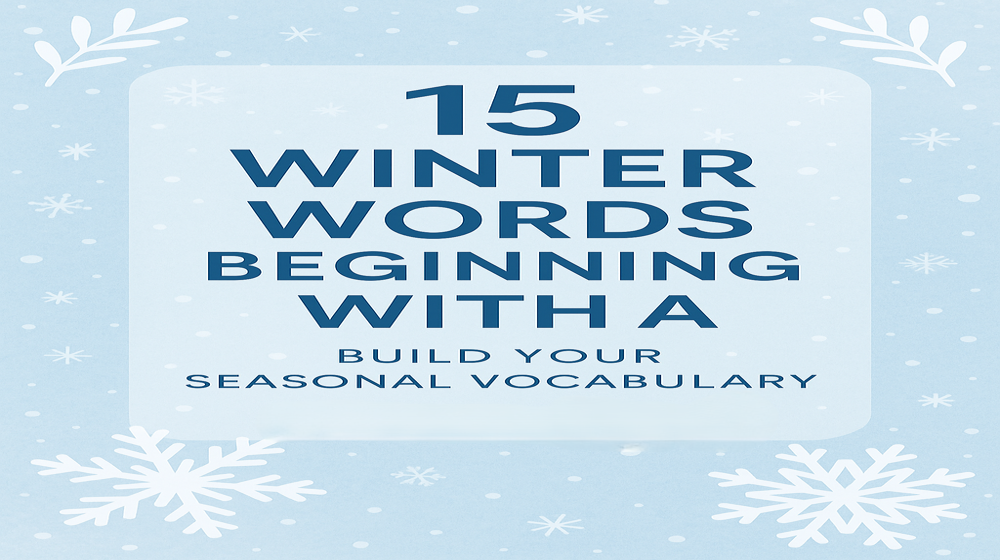

Do you love learning new words and enriching your vocabulary around specific themes? If yes, you’re going to enjoy today’s post! Welcome to English with Janet, where we explore the fun and beauty of English—one word at a time.
Today, we’re diving into winter words beginning with the letter A. Whether you’re a language learner, a writer, a teacher, or someone who just loves wordplay, this list will give you a frosty but fun tour of vocabulary that suits the colder months.
Let’s cozy up and explore these wintry “A” words.
Meaning: Relating to high mountains, especially the Alps.
Usage: “We enjoyed a magical winter vacation in an alpine village.”
Why it’s a winter word: Snow-covered mountain ranges, ski resorts, and chilly chalets – the word alpine instantly brings to mind the crisp and cold beauty of high elevations in winter.
Meaning: A waterproof jacket, typically with a hood, worn in cold and wet weather.
Usage: “Don’t forget your anorak—it’s snowing outside!”
Fun fact: Anorak comes from the Inuit word anoraq. It was originally made from seal or caribou skin to protect against Arctic cold.
Meaning: A large mass of snow, ice, and rocks that falls quickly down a mountainside.
Usage: “The hikers were warned about a possible avalanche in the area.”
Winter connection: This dramatic natural event is often associated with winter in snowy, mountainous regions. It’s also used metaphorically (e.g., “an avalanche of emotions”).
Meaning: A hot beverage made from apples, often spiced with cinnamon and cloves.
Usage: “We drank hot apple cider by the fireplace.”
Why it’s a winter favorite: This warm, sweet drink is popular during winter festivals and holidays. It makes your hands and heart feel warmer!
Meaning: Extremely cold; also refers to the region around the North Pole.
Usage: “The wind felt arctic as we stepped outside.”
Etymology: From the Greek word arktikos, meaning “near the bear” (referring to the constellation Ursa Major).
Winter tip: Use arctic to describe very cold weather—colder than just “cold”!
Meaning: The soft gray powder left after something burns.
Usage: “The ashes in the fireplace were still warm from last night’s fire.”
Why it fits winter: With more people using fireplaces, heaters, and stoves, ashes become a common sight in many homes during the colder months.
Meaning: An unusual and exciting experience, often involving exploration or travel.
Usage: “Our winter adventure included sledding, snowball fights, and hiking through snowy forests.”
Why it belongs here: Winter brings a spirit of adventure—whether it’s exploring snowy trails or trying out skiing for the first time.
👉 Related post:
Meaning: The invisible gas around us; in winter, it often refers to the chilly breeze.
Usage: “The morning air was crisp and cold.”
Note: Phrases like “nippy air,” “frosty air,” or “icy air” are commonly used in winter scenes in writing.
Meaning: A liquid added to a car engine to prevent freezing.
Usage: “Don’t forget to check the antifreeze in your car before winter sets in.”
Winter use: It’s a practical winter word that comes in handy when temperatures drop below freezing and you need your car running smoothly.
👉 Also read:
Meaning: A desire to eat.
Usage: “I always have a bigger appetite in winter!”
Winter link: Cold weather often makes us crave warm, comforting foods—soups, stews, hot chocolate, and baked goodies!
Meaning: The period beginning four Sundays before Christmas, a time of waiting and preparation.
Usage: “We lit the first candle on our Advent wreath.”
Why it matters in winter: In many cultures, Advent marks the beginning of the Christmas season—a major winter celebration.
Extra Tip: If you’d like to learn how different countries celebrate Advent and winter holidays, check out this helpful BBC Bitesize page on Christmas traditions around the world.
Meaning: (a) To descend and settle, as in snowflakes alighting gently;
(b) On fire or lit up.
Usage: “The snowflakes alighted softly on the rooftops.”
Winter feeling: It’s a poetic, gentle word that adds beauty to winter writing.
Meaning: On fire; brightly lit.
Usage: “The fireplace was ablaze, warming the whole cabin.”
Metaphorically: You can also say “the sky was ablaze with color” at sunset in winter!
Meaning: The footprints of animals in snow or mud.
Usage: “We followed the animal tracks through the snowy woods.”
Nature lovers’ winter joy: Seeing tiny paw prints in the snow is a special wintertime experience!
Meaning: Extra items worn to complete an outfit – in winter, this means scarves, gloves, hats, etc.
Usage: “She bundled up in winter accessories before heading outside.”
Fashion tip: A great chance to learn vocabulary related to winter wear!
Here’s a fun activity:
Take 3–5 words from the list above and write your own winter sentence or short paragraph. This is a great way to practice vocabulary and get creative!
Example:
“Wrapped in my anorak and winter accessories, I breathed in the crisp arctic air. An avalanche of snow fell from the treetops, and we continued our alpine adventure, sipping apple cider under a sky ablaze with stars.”
Learning seasonal vocabulary is not just about adding words to your memory—it’s about bringing scenes to life. Whether you’re writing a story, teaching your students, or simply enjoying language, these winter words beginning with A offer both beauty and usefulness.
So next time you’re describing a cold day or preparing a holiday lesson plan, try slipping in words like alpine, anorak, or advent to make your writing richer.
Don’t forget to save this post to your Winter Vocabulary Pinterest board—and share it with your friends or fellow teachers who love the English language.

Leave a Reply